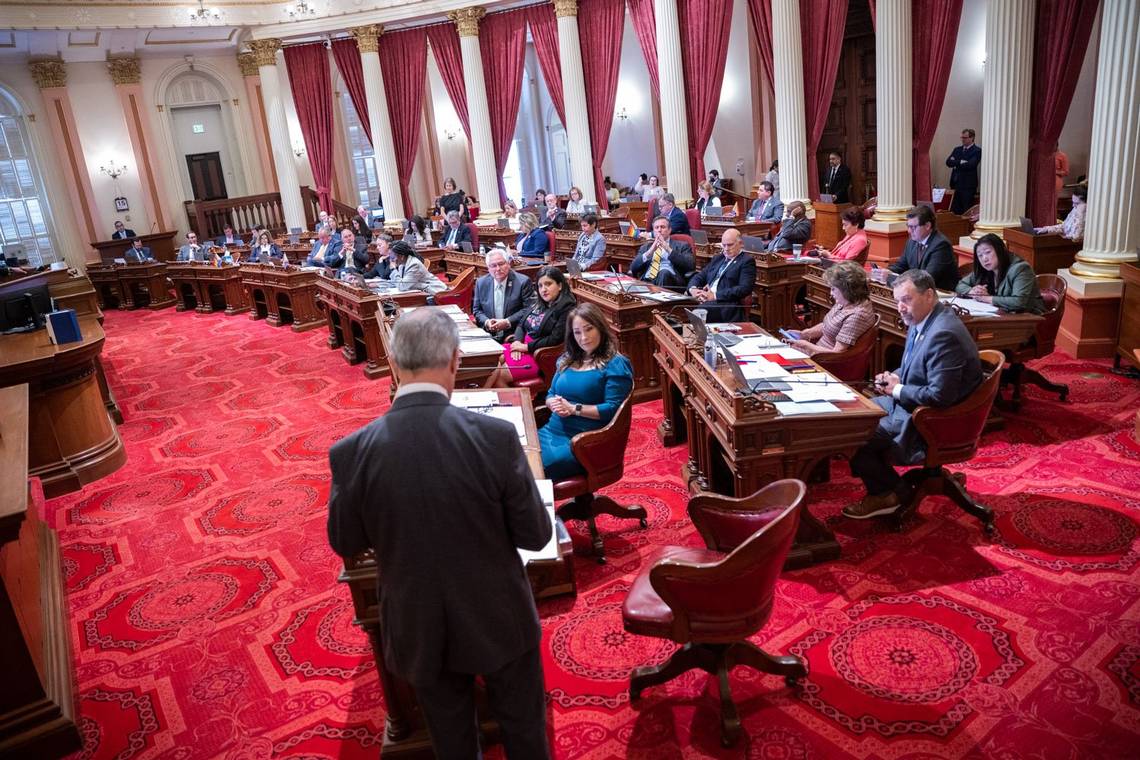California lawmakers on Thursday plan to vote on a bill with $17 billion in budget fixes.
The Legislature will likely approve the measure, which comes after Gov. Gavin Newsom, Assembly Speaker Robert Rivas, D-Hollister, and Senate President Pro Tem Mike McGuire, D-Healdsburg, last week announced they had all agreed to the set of fiscal adjustments.
The bill is considered “early action” because leaders are taking steps to address a projected budget deficit of up to $73 billion before they enter into negotiations over the fiscal year 2024-2025 spending plan.
Newsom presented his budget in January, and he called for the Legislature to take early action at that time. He will present a revised budget in May. The new fiscal year starts on July 1, and lawmakers must pass the overall budget by June 15.
Here’s what the legislation lawmakers took up on Thursday contains, how it will affect the projected deficit and what budget watchers are saying about it.
What’s in this bill?
The bill opens up previous budgets from the 2022-2023 and 2023-2024 fiscal years to find $17.3 billion in “solutions,” which include $3.6 billion in cuts, $5.2 billion in revenue and borrowing, $5.2 billion in delays and deferrals and $3.4 billion in cost shifts from the general fund to other state accounts.
Leaders are taking a closer look at recently-passed budgets to find money — some unspent — to help with this year’s spending plan.
For example, the legislation plans to put back into the general fund, or “revert,” $8.8 million from a 2022-2023 allocation of $10 million for the “Experience Corps grant program within CalVolunteers,” according to a staff report from the Senate Budget Committee.
“ExperienceCorps was meant to engage older Californians in volunteer service, but the program was undersubscribed,” the report said.
Scott Graves, budget director for the California Budget and Policy Center, called this kind of funding “like found money, in a way.”
The agreement Newsom, Rivas and McGuire reached also included a requirement to freeze other spending on one-time funding from 2021, 2022 and 2023, to preserve that money for negotiations to come.
In March, Newsom also signed an increase to the managed care organization, or MCO, tax on health insurers, which the state is using to leverage $1.5 billion in federal funds to help pay for California’s Medi-Cal program.
How will it affect the deficit?
It’s challenging to say how the early action will affect the overall projected budget deficit, in part because the groups involved in crafting the state’s spending plan are not in agreement about how much money the state needs to find.
The Legislative Analyst’s Office in December estimated leaders would be dealing with a $68 billion deficit during the next fiscal year.
Newsom’s Department of Finance in January said the spending gap was closer to $38 billion. The LAO in February updated its deficit estimate to $73 billion, based on new revenue collections information.
The Department of Finance will not update its deficit projection until Newsom presents his revised budget next month.
The Legislature’s April bill may have more to do with narrowing the down the choices lawmakers will need to make moving forward.
Graves said the early budget action represents a kind of “clearing the decks of a lot of these types of solutions that are fairly easy to reach a consensus on, and then they’ll leave the more challenging issues for discussion in May and June.”
“They’re picking a low-hanging fruit now,” he said. “Then they’ll come back to the fruit higher up on the tree later on, where it’s going to be harder to reach agreements. Because they will not necessarily all see eye-to-eye on some of these things.”
What do budget-watchers think?
Graves said his organization, a nonpartisan research nonprofit, thinks the early action deal is a “reasonable approach, recognizing that they’re just partially closing the state budget gap, but they’re also protecting ongoing funding for critical services, which is something that we are very concerned about.”
The Budget and Policy Center has advocated for Newsom and lawmakers to consider revenue-raising strategies to continue protecting those services, such as suspending corporate tax breaks. The governor has been staunchly opposed to any tax increases.
“We argue that this should be on the table this year,” Graves said. “Particularly if they’re saying that they’re going to need to consider potentially deep cuts to ongoing critical services like health care, safety net, education, higher ed, things along those lines.”
